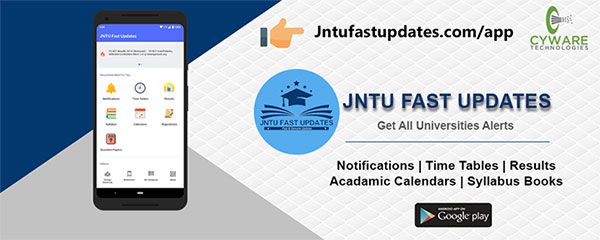JNTUK R20 2-1 OOPS C++ Material/Notes PDF Download
Students those who are studying JNTUK R20 CSE Branch, Can Download Unit wise R20 2-1 Object Oriented Programming through C++ (OOPS) Material / Notes / Test Books PDFs below.

JNTUK R20 2-1 Object Oriented Programming through C++ Material PDF Download
Course Objectives:
- Describe the procedural and object oriented paradigm with concepts of streams, classes, functions, data and objects
- Understand dynamic memory management techniques using pointers, constructors, destructors
- Describe the concept of function overloading, operator overloading, virtual functions and polymorphism
- Classify inheritance with the understanding of early and late binding, usage of exception handling, generic programming
- Demonstrate the use of various OOPs concepts with the help of programs
UNIT-1
Introduction to C++: Difference between C and C++, Evolution of C++, The Object Oriented Technology, Disadvantage of Conventional Programming, Key Concepts of Object Oriented Programming, Advantage of OOP, Object Oriented Language.
Download UNIT-1 Material PDF | Reference-2
UNIT-2
Classes and Objects &Constructors and Destructor: Classes in C++, Declaring Objects, Access Specifiers and their Scope, Defining Member Function, Overloading Member Function, Nested class, Constructors and Destructors, Introduction, Constructors and Destructor, Characteristics of Constructor and Destructor, Application with Constructor, Constructor with Arguments parameterized Constructor, Destructors, Anonymous Objects.
Download UNIT-2 Material PDF | Reference-2
UNIT-3
Operator Overloading and Type Conversion & Inheritance: The Keyword Operator, Overloading Unary Operator, Operator Return Type, Overloading Assignment Operator (=), Rules for Overloading Operators, Inheritance, Reusability, Types of Inheritance, Virtual Base ClassesObject as a Class Member, Abstract Classes, Advantages of Inheritance, Disadvantages of Inheritance.
Download UNIT-3 Material PDF | Reference-2
UNIT-4
Pointers & Binding Polymorphisms and Virtual Functions: Pointer, Features of Pointers, Pointer Declaration, Pointer to Class, Pointer Object, The this Pointer, Pointer to Derived Classes and Base Class, Binding Polymorphisms and Virtual Functions, Introduction, Binding in C++, Virtual Functions, Rules for Virtual Function, Virtual Destructor.
UNIT-5
Generic Programming with Templates & Exception Handling: Definition of class Templates, Normal Function Templates, Over Loading of Template Function, Bubble Sort Using Function Templates, Difference between Templates and Macros, Linked Lists with Templates, Exception Handling, Principles of Exception Handling, The Keywords try throw and catch, Multiple Catch Statements, Specifying Exceptions. Overview of Standard Template Library, STL Programming Model, Containers, Sequence Containers, Associative Containers, Algorithms, Iterators, Vectors, Lists, Maps.
e-Resources:
Text Books:
1) A First Book of C++, Gary Bronson, Cengage Learning.
2) The Complete Reference C++, Herbert Schildt, TMH.
Reference Books:
1) Object Oriented Programming C++, Joyce Farrell, Cengage.
2) C++ Programming: from problem analysis to program design, DS Malik, Cengage Learning
3) Programming in C++, Ashok N Kamthane, Pearson 2nd Edition
Course Outcomes: By the end of the course, the student
- Classify object oriented programming and procedural programming
- Apply C++ features such as composition of objects, operator overloads, dynamic memory allocation, inheritance and polymorphism, file I/O, exception handling
- Build C++ classes using appropriate encapsulation and design principles
- Apply object oriented or non-object oriented techniques to solve bigger computing problems


320-x100(1).gif)

c lab manual
Yes we want c lab manual
we want c lab manual
c lab manual
we want java lab manual